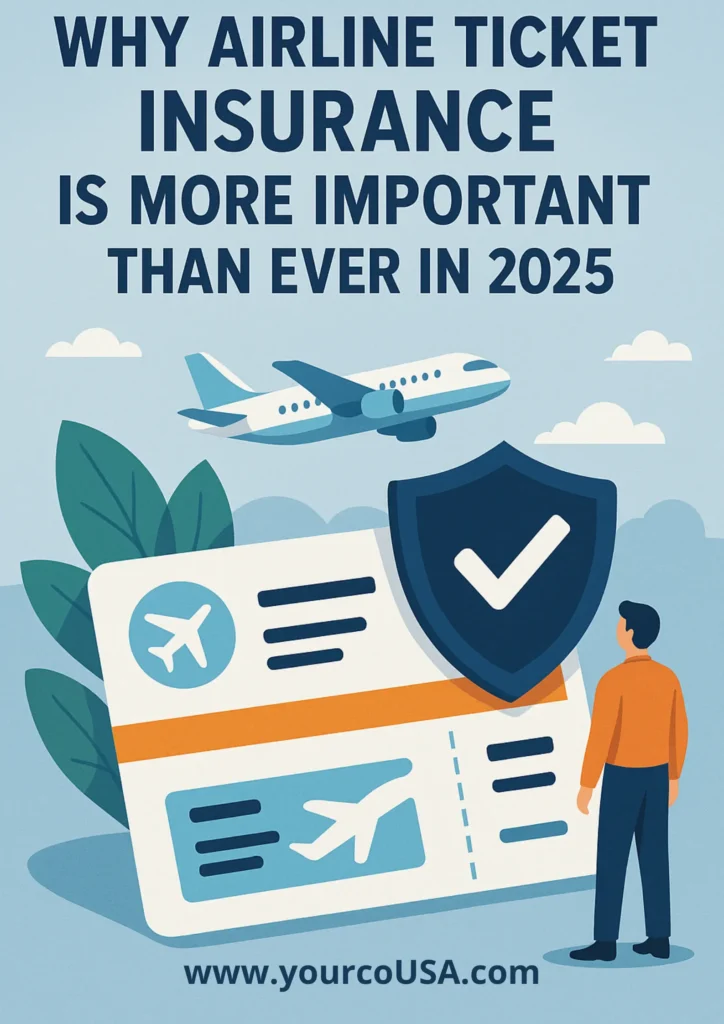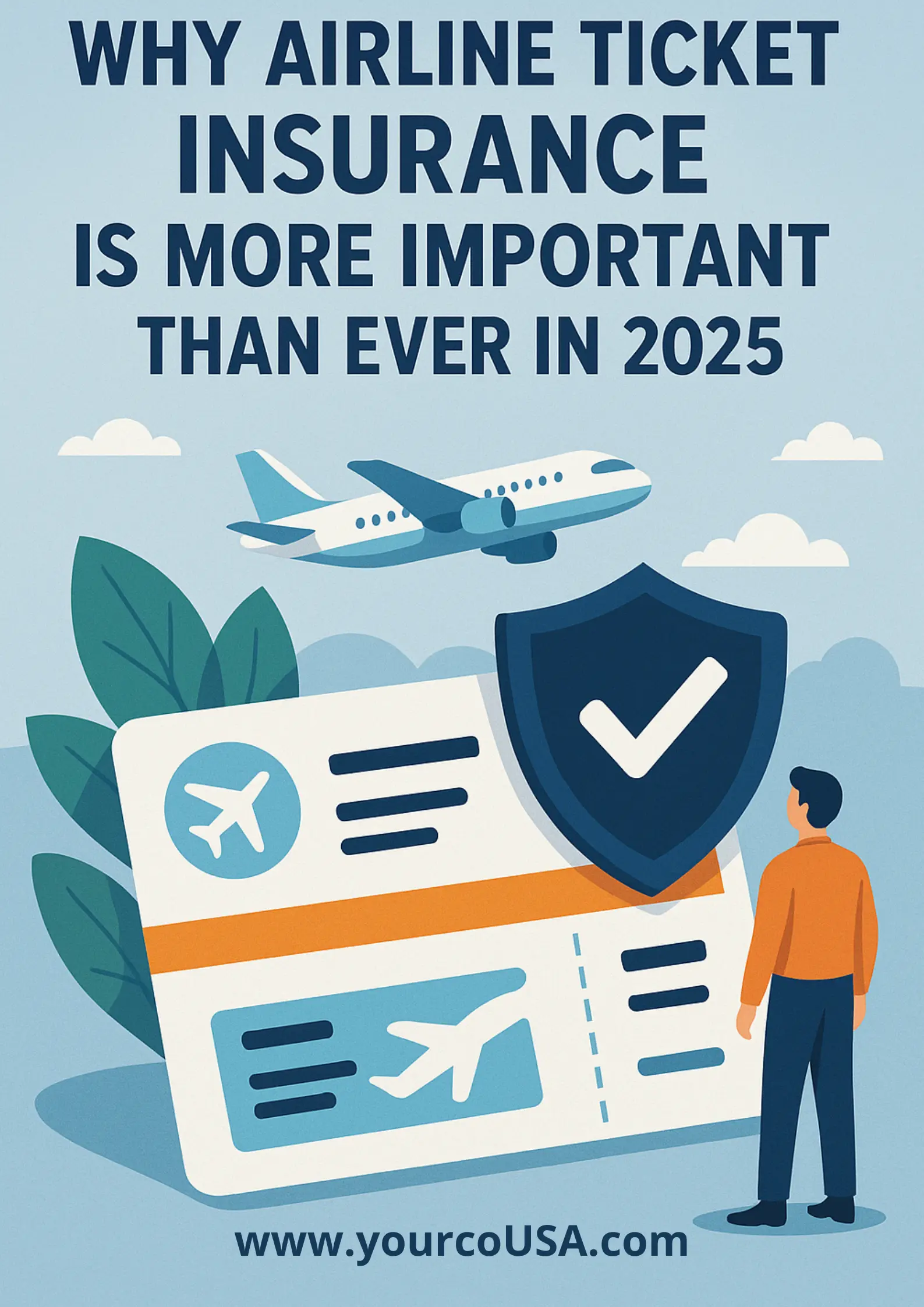This vacation has been in your dreams for weeks. Your luggage is at the door, your plans are set, and you can already see yourself relaxing when you get there. The worst news suddenly appears on your phone: Your flight has been canceled. Not a warning. No contingency plan. All of the money you spent is now, literally, in the air.
Does that sound familiar? It might happen shortly if it doesn’t now.
Air travel has changed significantly in 2025. Flying isn’t as simple as it used to be because of erratic weather, airline strikes, and changing international health standards. This is where Airline Ticket Insurance steps in as your invisible hero. It’s no longer just an optional extra; it’s your safety net in today’s unpredictable travel landscape.

Table of Contents
What Is Airline Ticket Insurance (And Why You Need It Now More Than Ever)
Understanding the Basics
At its core, airline ticket insurance is a financial backup. It covers you when plans go sideways. Whether it’s a canceled flight, a last-minute medical emergency, or lost luggage, this type of policy can help you recover non-refundable expenses that would otherwise be lost.
But what does that actually mean for you?
It means not having to eat the cost of a $1,500 international flight if you test positive for COVID the night before. It means being reimbursed if your trip gets canceled due to a hurricane. And in 2025, those “what ifs” are becoming “more likely than not.”
How Travel Has Changed in 2025
The travel environment has shifted. What used to be occasional hiccups have become consistent concerns. Consider the following:
Extreme weather is disrupting more flights due to climate change
- Airline staffing shortages and labor strikes are growing more frequent
- Health regulations are still changing month-to-month
- Fewer flights are being offered, making rescheduling more difficult
- Ticket prices are rising, increasing your financial risk if things go wrong
Comparison Table: Travel Issues Then vs. Now
| Issue | 2020 | 2025 (Current Trends) |
|---|---|---|
| Flight Cancellations | Moderate | Frequent |
| Airline Labor Strikes | Occasional | Increasing Rapidly |
| Severe Weather Events | Some | Significantly Higher |
| Flexible Tickets Availability | Common | Less Frequent |
| International Entry Rules | Stable | Constantly Changing |
Why Airline Ticket Insurance Matters More Than Ever
Financial Protection That Makes Sense
Imagine spending hundreds—or thousands—on plane tickets, only to lose everything when plans change. That’s a real risk, especially with non-refundable tickets being the cheaper (and often only) option.
Airline ticket insurance steps in where airlines fall short:
- Reimbursement for canceled flights
- Protection if your trip gets interrupted
- Compensation for overnight delays
A Safety Net for Unforeseen Events
You can’t predict when a family emergency will hit. Or when your flight will be grounded due to ash clouds or pilot strikes. But with coverage in place, you don’t have to worry about the “what now” moments.
You’re backed by a plan that absorbs the blow—and keeps your wallet safe.
The Confidence to Book Without Fear
Hesitating to book early? You’re not alone. Flexible plans are harder to find, and prices are only climbing. But with the right policy, you can:
- Book early without stress
- Avoid high last-minute fares
- Recover your investment if plans shift
Top Scenarios Where Airline Ticket Insurance Pays Off
- You test positive before travel
- Weather grounds your flight
- Political unrest closes your destination
- A family member is hospitalized
- Your airline files for bankruptcy
What to Look for in the Right Airline Ticket Insurance Policy
Not all insurance policies are created equal. Here’s what to pay attention to before you click “Add to Cart.”
Must-Have Coverage Options
Look for a policy that includes:
- Trip Cancellation: Reimburses non-refundable tickets
- Trip Interruption: Covers you if you need to cut your trip short
- Medical Emergencies: Particularly important for international travel
- Baggage Loss/Delay: Compensates for your essentials
- Travel Delay: Covers meals, lodging, and transportation during disruptions
Beware of Exclusions
Policies often come with fine print. Common exclusions include:
- Pre-existing medical conditions (unless covered with a waiver)
- High-risk activities (extreme sports, etc.)
- Changes due to fear of travel without a valid reason
- Late policy purchases (after an event has occurred)
Checklist for Comparing Providers
Before choosing a policy, run through this:
- Clear, detailed coverage explanation
- Reasonable pricing (4–10% of ticket cost)
- Strong customer reviews and ratings
- 24/7 customer support access
- A trustworthy underwriter or partner (AIG, Allianz, etc.)
Airline Ticket Insurance vs. Full Travel Insurance
You might be wondering—why not just buy full travel insurance?
Here’s the Difference:
- Airline Ticket Insurance focuses solely on the flight—covering cancellations, delays, and ticket-related issues.
- Travel Insurance includes broader protections, like hotel costs, health emergencies, trip activities, and sometimes even rental cars.
When You Need More Than Flight Coverage
- Planning a multi-city tour across Europe?
- Staying in resorts or vacation rentals?
- Traveling to a region with known political unrest or disease risk?
In these cases, go beyond ticket insurance. But if your trip is flight-focused—say, a quick business trip or a domestic getaway—airline ticket insurance might be the ideal fit.
How to Buy Airline Ticket Insurance in 2025
So, where do you start?
Best Ways to Purchase:
- Directly from the Airline: Convenient, but not always the best value.
- Comparison Sites: Sites like Squaremouth, InsureMyTrip, or TravelInsurance.com show multiple options.
- Through a Travel Agent or Insurance Broker: Best if your trip is complex.
Smart Tips to Save Money
- Buy Early: Some policies require purchase within 14 days of booking.
- Bundle Wisely: You might get discounts by adding hotel or rental insurance.
- Read the Fine Print: Always understand what you’re buying. If it’s vague, move on.
Real-Life Stories: Why This Insurance Matters
Stories from real travelers often hit harder than facts. These are examples of how airline ticket insurance changed the game:
Maria’s Honeymoon Disruption
She booked a dream trip to Bora Bora. Two days before departure, she tested positive for COVID. Without insurance, she would’ve lost $4,300. Instead, she filed a claim and was reimbursed within three weeks.
Tom’s Luggage Disaster
Tom flew from New York to Rome. His checked luggage vanished. With insurance, he received $500 to replace essentials within 48 hours.
Conclusion:
You wouldn’t drive without car insurance. You wouldn’t buy a house without coverage. So why risk traveling in 2025 without protecting your airline ticket?
With rising disruptions, stricter refund policies, and soaring airfare, airline ticket insurance isn’t an afterthought—it’s a smart decision. It’s your answer to unpredictable skies and ever-changing rules.
FAQ : about Airline Ticket Insurance
Is airline ticket insurance really worth it in 2025?
Yes. With increasing travel uncertainties—from weather to labor strikes—it’s no longer optional. It’s essential.
How much does airline ticket insurance cost?
Typically, you’ll pay between 4–10% of the ticket price, depending on the coverage.
Can I buy airline ticket insurance after booking?
Yes, but options may be limited. For full coverage (like “Cancel for Any Reason”), buy within 14–21 days of your flight booking.
Does it cover health emergencies?
Most policies cover emergencies that require cancellation or trip interruption. For comprehensive medical coverage abroad, consider full travel insurance.
What’s the best provider?
It depends on your destination, travel style, and needs. Allianz, AIG, and Berkshire Hathaway are reputable names, but always compare policies.








Leave a Reply